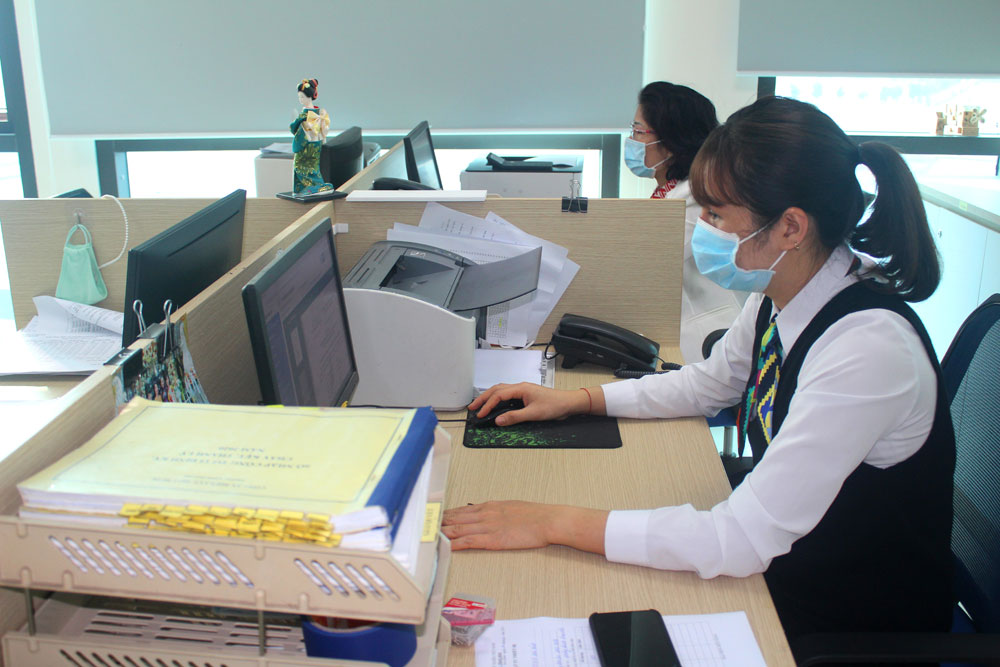
(HBO) – Besides bringing practical benefits to customers, cashless payment for power bills makes positive contributions to containing the COVID-19 pandemic.

Paying power bills digitally brings practical benefits to customers, and contributes to preventing the COVID-19 pandemic.
Currently, Hoa Binh Power Company (PC Hoa Binh) is managing 258,000 customers, up 10,000 customers from the previous year. PC Hoa Binh has carried out a wide range of measures in an effort to provide better services for the customers. Earlier, the firm promote communication work to instruct its customers with cashless payment process. Accordingly, electricity bill payment can be made through automatic payment via bank account, smartbanking, internetbanking, UNT/UNC, e-wallet, National Public Service Portal, and many other channels.
Nguyen Thi Thanh, a resident in Thinh Lang ward, Hoa Binh city, has moved to pay for her family’s power bills via bank account in the past two years. She said her family does not experience power cut due to late payment for the bill anymore. Now, a smartphone connected to the Internet enables her to access power bill and pay for it via her bank account.
According to Tran Thi Ut, head of the business bureau at PC Hoa Binh, cashless payment for power bills benefit customers a lot since they do not have to wait for a long time for the payment and archive the bills. Furthermore, it is much convenient for the customers to look up for information and services via the customer service website.
She said 28 percent of the customers used the cashless payment method when it was launched in 2018, and the figure increased to 32 percent in 2019 and 42 percent in 2020. Hoa Binh city has the most customers using cashless payment, with over 80 percent, followed by Luong Son district with 38 percent. PC Hoa Binh targets to have 70 percent of its customers paying bills digitally.
In a bid to realise the set goal, PC Hoa Binh hopes to receive assistance from the customers as well as local authorities’ communication work, Ut said, adding in the context of complicated developments of COVID-19, cashless payment partly contributes to the pandemic prevention efforts./.
Hoa Binh province is undergoing a dynamic transformation amid Vietnam’s national digital transition. Building on Poliburo’s Resolution No. 57-NQ/TW on breakthroughs in science, technology, innovation, and national digital transformation, the province has rolled out a wide range of practical action plans. A standout initiative is the "Digital Literacy for All” movement, an effort to ensure that no one is left behind in the digital era.
Hoa Binh province is undergoing a dynamic transformation in the wake of the national digital transformation movement. Building on Resolution No. 57-NQ/TW of the Politburo on breakthroughs in science, technology, innovation, and national digital transformation, the province has implemented a wide range of practical action plans. A standout initiative is the "Digital Literacy for All” movement ambitious effort to ensure that no one is left behind in the digital age.
With a spirit of unity and proactive problem-solving, the Party Committee, the government and the people of Dong Lai Commune (Tan Lac District) have made great strides in implementing the resolutions of the 24th Party Congress of the commune for the 2020 - 2025 term. Focusing on leadership and practical actions, the commune has brought the Party’s resolutions into daily life, creating strong impacts and pushing the local development forward.
Amid the nationwide push for digital transformation, young people in Hoa Binh Province are stepping up as dynamic pioneers, applying technology to enhance Youth Union operations and expand the reach of youth-led initiatives. Through creativity and adaptability, Youth Union organizations at all levels have introduced a series of practical solutions, contributing to modern governance and community development.
In recent years, An Nghia commune, located in Lac Son district, has stepped up administrative reform, focusing on improving the quality and efficiency of its single-window service unit for receiving and processing administrative procedures. These improvements have helped create favourable conditions for local residents and organisations to handle administrative procedures, contributing to the commune’s broader socio-economic development.
The Prime Minister-approved master plan to develop the multi-use value of forests ecosystems through 2030, with a vision to 2050, aims to improve the management and sustainable use of forest resources, create jobs, increase incomes, and improve the living standards of ethnic minorities, people in mountainous and remote areas, forest workers and those living near forests.



